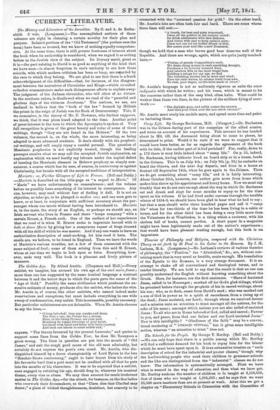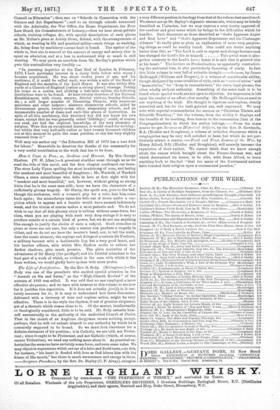The Schools for the People. By George T. Bartley. (Bell
and Daddy.) —We can only hope that there is a public among which Mr. Bartley will find a sufficient demand for his book to repay him for the labour which he must have spent upon it. It lean exhaustive treatise on "each description of school for the industrial and poorer classes," though why the hardworking people who send their children to grammar-schools. and the like are distinguished from the " industrial " classes we do not know. The information is systematically arranged. First we have what is wanted in the way of education, and then what we have got.. Mr. Bartley reckons the number of children to be taught at 2,158,659,. that of those who are taught at 1,384,203; and he says that we want 25,500 more teachers than are at present at work. After this we got a chapter on "Elementary Schools in Connection with the Committee of Council on Education"; then one on "Schools in Connection with the Science and Art Department " ; and so on through schools connected with the Admiralty, the War Office, the Home Department, the Poor Law Board, the Commissioners of Lunacy,—then we hear about private schools, training colleges, dm., with special descriptions of such places as Mr. Miller's place at Ashley Down, Bristol, with the arrangements of which, as wanting in life and practical utility—such things as washing, &c, being done by machinery—some fault is found. The upshot of the whole is, that one is amazed at the amount of energy and money that is epent on education, and at a loss to understand why so much is still wanting. We may quote an anecdote from Mr. Bartley's preface which puts this contradiction very forcibly :— " In pursuing inquiries at the East End of London in February, 1870, I took particular interest in a sharp little fellow with whom I became acquainted. He was about twelve years of age, and his residence, if it could be called such, was within a mile of the Bank of England and the mansion of the Lord Mayor. It was also within fifty yards of a Church-of-England [rather a strong phase] vicarage. Taking his home as a centre, and striking a half-mile radius, the following institutions were to be found. At least twenty churches of the National Establishment, with vicars,. curates, district visitors, Sunday Schools, ac. ; a still larger number of Dissenting Chapels, with numerous ministers and other helpers ; nineteen elementary schools, aided by Government grants, twenty-seven other elementary schools, and an innumerable number of dame and such-like places of instruction. In spite of all this machinery, this wretched boy did not know his own name, except that he was generally called Diddlego ;' could, of course, not read, nor had the slightest knowledge of the very elements of religion. Were this an exceptional instance, it would stand for nothing ; but within that very half-mile radius at least twenty thousand children are at this moment in quite the same position, or One but very slightly removed from it."
Well may our author say "the Education Bill of 1870 has a vast field for labour." Meanwhile he deserves the thanks of the community for a very useful contribution to the work that has to be done.



































 Previous page
Previous page